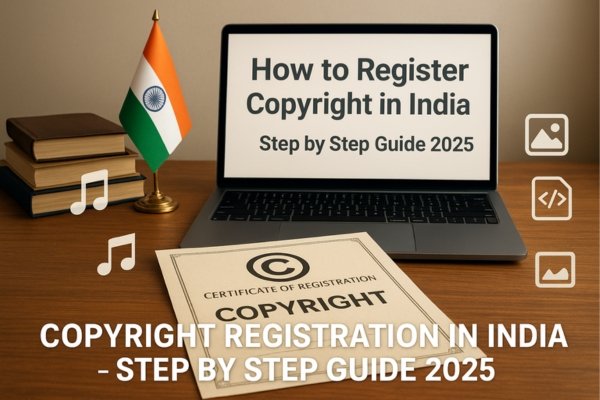
For Applying Copyright Registration Click Here…
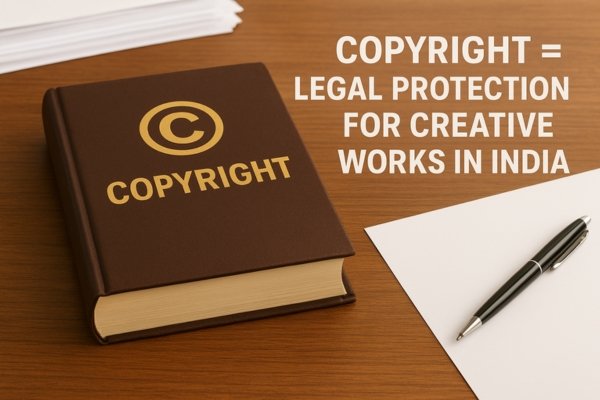
What is Copyright in India?
Copyright in India is a legal right that protects the original works of creators such as authors, artists, musicians, filmmakers, and software developers. It ensures that the person who has created a piece of work has exclusive rights over its use, distribution, and reproduction. In simple terms, copyright is like a shield that prevents others from copying or misusing your work without permission.
When learning how to register copyright in India, it’s important to first understand that copyright covers creative works like books, paintings, films, music, computer programs, and even websites. It does not protect ideas or concepts but only the tangible expression of those ideas.
📌 Meaning and Definition
The meaning of copyright in India lies in safeguarding intellectual property. According to the Copyright Act, 1957, copyright refers to the exclusive legal right granted to the creator of an original work, giving them control over how their work is used. This means no one else can reproduce, publish, or sell that work without the creator’s consent.
The definition of copyright in India can be understood as the recognition of ownership of creative content. For instance, if you write a novel, compose a song, design software, or make a movie, copyright ensures that you are acknowledged as the rightful owner and your work cannot be exploited by others. Understanding this definition is the first step before diving into the process of how to register copyright in India.
📌 Importance of Copyright for Creators
For creators, copyright is more than just a legal formality—it is a way of protecting their creativity and livelihood. Here’s why copyright is important:
✅ Protection from Infringement – It prevents others from copying, reproducing, or misusing your original work without authorisation.
✅ Recognition of Ownership – It ensures the creator is recognised as the rightful owner of their content.
✅ Commercial Benefits – With copyright, creators can license or sell their work and earn revenue.
✅ Moral Rights – Copyright law also safeguards the reputation of creators by giving them the right to claim authorship and object to any distortion of their work.
For anyone researching how to register copyright in India, understanding its importance is crucial. Without copyright, creators risk losing both recognition and financial benefits from their hard work.
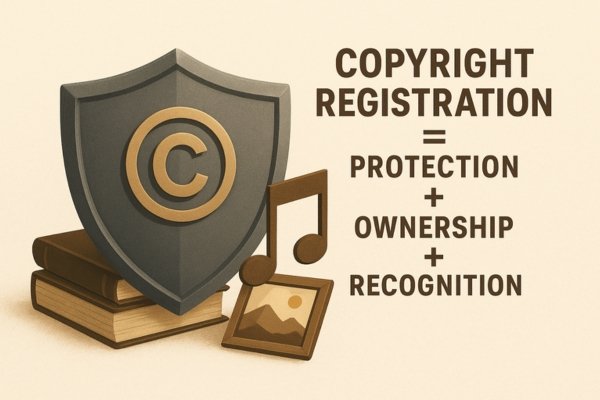
Why Should You Register Copyright?
Many creators wonder why registration is necessary when copyright automatically exists once a work is created. The answer is simple—registration gives your work a stronger legal standing. If you are exploring how to register copyright in India, it is essential to understand the benefits of doing so.
✅ Legal Protection Against Infringement
Once you register your copyright, you gain stronger legal protection against infringement. If someone copies, reproduces, or misuses your work without permission, a registered copyright serves as solid proof of ownership in court. This makes it much easier to take legal action and claim damages. For anyone learning how to register copyright in India, the biggest advantage is this legal safeguard that helps protect your creativity.
✅ Commercial and Moral Rights
Copyright registration not only secures your creative work but also unlocks commercial opportunities. With a registered copyright, you can license your work, sell rights to publishers, or collaborate with businesses for monetary benefits. At the same time, moral rights ensure that your name stays connected with your creation, and no one can distort or misrepresent it. These rights are a crucial part of why creators choose to learn how to register copyright in India.
✅ Recognition of Ownership
A registered copyright serves as an official record that you are the rightful owner of your work. This recognition adds credibility and value to your content, whether it’s a book, a song, a painting, or software. In case of disputes, registration makes it easier to prove that you are the original creator. For artists, authors, and entrepreneurs, this recognition is one of the strongest reasons to explore how to register copyright in India.

Works Eligible for Copyright Registration
Before you begin the process of registering copyright in India, it’s important to know which types of creations are eligible for copyright protection. The Copyright Act, 1957, recognises a wide range of works across literature, art, music, films, and technology. Here’s a breakdown of the major categories:
📖 Literary Works (Books, Articles, Blogs, etc.)
Literary works include novels, poems, stories, textbooks, research papers, articles, blogs, and even computer code written in textual form. If you are an author, blogger, or academic, registering your work ensures nobody can copy or republish it without your consent. When understanding how to register copyright in India, literary works are among the most commonly registered categories.
🎨 Artistic Works (Paintings, Drawings, Logos, etc.)
Artistic works cover paintings, sketches, sculptures, logos, photography, and even designs. For businesses, logo copyright is crucial as it prevents others from using or duplicating brand identities. Artists and designers who learn how to register copyright in India can safeguard their creative pieces from unauthorised reproductions.
🎵 Musical Works
Musical compositions, whether in the form of written notes, lyrics, or sound recordings, are also protected under copyright. Registering ensures that your music cannot be reproduced, sold, or used commercially without your permission. Musicians and composers especially benefit from understanding how to register copyright in India, as it helps them protect both creative and financial interests.
🎬 Cinematographic Films and Sound Recordings
Films, documentaries, web series, and sound recordings such as podcasts or audiobooks are also eligible for copyright protection. Once registered, producers and creators gain exclusive rights over distribution, broadcasting, and monetisation. If you are in the film or media industry, learning how to register copyright in India is essential for protecting your content.
💻 Computer Software
In today’s digital world, computer programs and software are also covered under copyright. This includes apps, operating systems, and source code. By registering, software developers can safeguard their innovations from duplication or piracy. For tech entrepreneurs, understanding how to register copyright in India is key to protecting intellectual property in a competitive market.
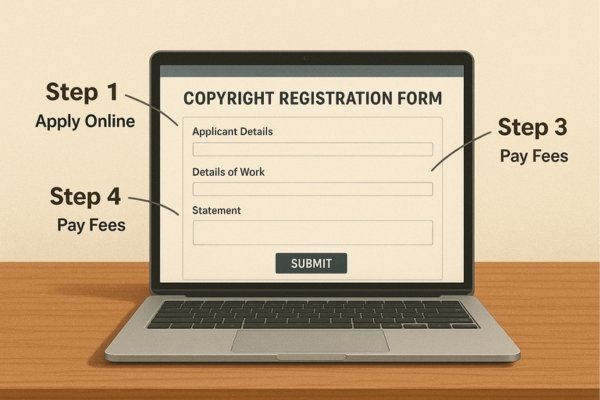
Step-by-Step Process to Register Copyright in India
If you’re a creator, author, musician, or business owner, understanding how to register copyright in India is a valuable step to protect your work. The process is fairly straightforward and is managed by the Copyright Office under the Ministry of Commerce and Industry. Here’s a detailed breakdown of each step:
✅ Step 1: Create an Account on the Copyright Office Portal
Visit the official Copyright Office website (copyright.gov.in) and create an account. This online portal is the starting point for anyone who wants to learn how to register copyright in India. After registration, you’ll be able to file applications, upload documents, and track your status.
✅ Step 2: Fill in the Application (Form XIV)
Once logged in, you need to fill out Form XIV, which is the official copyright registration form. The form requires details about the applicant, the type of work (literary, artistic, musical, etc.), and ownership information. This is a key step in how to register copyright in India, as accuracy in the application ensures smooth processing.
✅ Step 3: Attach Supporting Documents
Along with the application, you must upload or submit copies of the work you want to protect. For example, authors must submit manuscripts, musicians submit recordings, and software developers provide a sample of the source code. A Power of Attorney is also required if the application is filed through an agent. Document submission is an essential part of how to register copyright in India.
✅ Step 4: Pay the Prescribed Fees
The next step is to pay the required government fees, which vary depending on the category of work. Payment can be made online through net banking, debit/credit cards, or other available modes. This fee confirms your application unforow to register copyright in India.
✅ Step 5: Submission and Diary Number
After successful submission, you’ll receive a Diary Number. This number acts as your reference ID to track the status of your application. It is a vital acknowledgement when going through how to register copyright in India.
✅ Step 6: Examination by the Registrar
The Copyright Office reviews the application and checks for any discrepancies or objections. If everything is correct, the registrar proceeds with the process. If any issues arise, you will be notified. This examination step ensures that your claim is genuine under how to register copyright in India.
✅ Step 7: Hearing (If Required)
If there are objections (either from the registrar or third parties), a hearing may be scheduled. Here, you’ll have the opportunity to present your case and prove your ownership. Not every application requires a hearing, but it is part of the legal process for registering copyright in India.
✅ Step 8: Issuance of Copyright Certificate
Once the application clears examination and objections (if any), the Copyright Office issues a Copyright Registration Certificate. This certificate serves as official proof of ownership and ensures complete legal protection for your work. This final step completes the journey of how to register copyright in India.
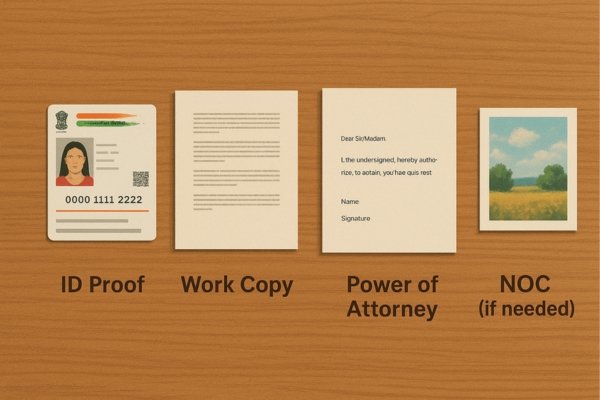
Documents Required for Copyright Registration
Before diving into the actual process of how to register copyright in India, it is essential to keep the necessary documents ready. Having the right paperwork ensures that your application is processed smoothly without delays. Below are the key documents you will need:
✅ Identity Proof of the Applicant
Every applicant must provide a valid identity proof, such as an Aadhaar card, PAN card, voter ID, or passport. This establishes the authenticity of the person or organisation applying for copyright. For those exploring how to register copyright in India, identity proof is the first basic requirement.
✅ Copies of the Work
A few copies of the work being registered must be submitted to the Copyright Office. For literary works, this may include manuscripts or books; for music, it could be audio recordings or sheet music; for software, a sample of source code. These copies help the registrar verify originality and ownership. Without this, the process of how to register copyright in India cannot move forward.
✅ Power of Attorney (If Filed by Agent)
If the copyright application is filed through a lawyer or an authorised agent, a signed Power of Attorney (PoA) is required. This legal document authorises the agent to act on behalf of the creator. Anyone learning how to register copyright in India should know that this step is mandatory when applying through a representative.
✅ NOC (If Required)
In some cases, a No Objection Certificate (NOC) may be required. For example, if you are registering a logo that is being used by a business, the company may need to provide an NOC. Similarly, in collaborative works, co-creators may have to submit their consent. This ensures transparency in the process of registering copyright in India.

Fees for Copyright Registration in India
When learning how to register copyright in India, understanding the fee structure is important. The Copyright Office has fixed charges depending on the type of work being registered. Knowing these charges in advance helps creators plan better and avoid last-minute surprises.
✅ Fee Structure for Different Types of Works
The government has prescribed different fees for different categories of work. Some of the common charges are:
Literary, Dramatic, Musical, or Artistic Works (except logo designs used for business): ₹500 per work.
Artistic Works used as Logos/Labels for Business: ₹2,000 per work.
Cinematograph Films: ₹5,000 per film.
Sound Recordings: ₹2,000 per recording.
Computer Software/Programs: ₹5,000 per work.
👉 These charges may be revised by the Copyright Office from time to time. For creators, knowing this structure is an essential part of how to register copyright in India.
✅ Online Payment Process
The fee for copyright registration can be paid directly through the official Copyright Office portal (copyright.gov.in). Once you log in and fill out Form XIV, the system redirects you to the payment gateway. You can pay using:
Net banking
Debit or credit cards
UPI or other digital payment modes
After successful payment, a receipt is generated, which should be saved for future reference. This online payment process makes registering a copyright in India faster, more transparent, and hassle-free.
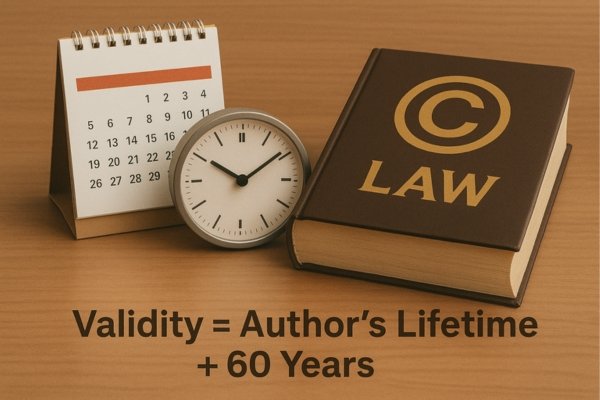
How Long Does Copyright Last in India?
When exploring how to register copyright in India, one of the most important aspects to understand is the duration of protection. Copyright does not last forever, but it provides creators with long-term security and control over their work.
In India, the general rule is:
For Literary, Musical, Dramatic, and Artistic Works: Copyright lasts for the lifetime of the author plus 60 years after their death. This means that the creator’s heirs or legal representatives can continue to enjoy the rights for six decades after the author’s lifetime.
For Cinematograph Films, Sound Recordings, Government Works, and Anonymous or Pseudonymous Works: The term of copyright is 60 years from the year of publication.
This extended duration ensures that creators and their families benefit from the work for a significant period. For example, if an author writes a novel, the copyright protection continues throughout their life and 60 years beyond, preventing unauthorised use even after their passing.
👉 Understanding the duration of protection is just as crucial as learning how to register copyright in India, because it highlights how long your creative rights are safeguarded by law.

Benefits of Copyright Registration in India
When creators learn how to register copyright in India, they often focus on the process itself. But the real value lies in the benefits that come with registration. Copyright is not just a legal formality—it is a powerful tool to protect, monetise, and establish ownership of your work.
✅ Exclusive Rights to the Creator
Once registered, copyright grants the creator exclusive rights over their work. This includes the right to reproduce, distribute, perform, display, and adapt the creation. For example, an author can control how their book is published, or a musician can decide where their song is played. Understanding how to register copyright in India ensures that you can fully exercise these rights without interference.
✅ Prevents Unauthorised Use
One of the biggest advantages of copyright registration is that it acts as a shield against infringement. If someone tries to copy, reproduce, or sell your work without permission, the registered copyright certificate serves as strong legal proof of ownership. This makes it easier to take legal action and claim damages. For creators exploring how to register copyright in India, this protection is one of the most valuable benefits.
✅ Helps in Monetisation and Licensing
Copyright not only protects creativity but also helps creators earn from their work. With a registered copyright, you can license or sell your rights to publishers, production houses, or digital platforms. This creates multiple revenue streams while still maintaining ownership. For businesses and individuals alike, learning how to register copyright in India is the first step toward turning creativity into income.
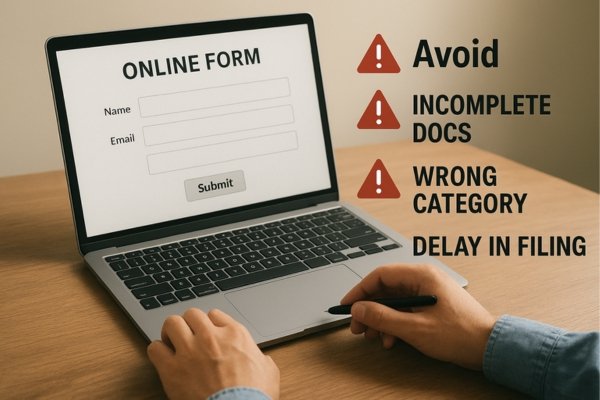
Common Mistakes to Avoid in Copyright Registration
While learning how to register copyright in India, many creators unknowingly make errors that can delay or even reject their application. Being aware of these common mistakes can save time, money, and unnecessary legal hassles.
❌ Incomplete Documentation
One of the most frequent mistakes is submitting incomplete or missing documents. Without valid identity proof, copies of the work, or supporting documents like a Power of Attorney (if filed by an agent), the application may be rejected. To avoid this, always prepare your documents in advance before starting the process of registering copyright in India.
❌ Wrong Classification of Work
Every creative work falls into a specific category—literary, artistic, musical, software, cinematographic, or sound recordings. Many applicants mistakenly classify their work under the wrong category, which causes complications during examination. For example, registering a business logo as a regular artistic work instead of under the “logo/label” category may lead to objections. Correct classification is a critical part of how to register copyright in India.
❌ Delay in Filing
Another common mistake is delaying the registration process. Copyright protection is stronger when registered early, as it serves as proof of ownership from the date of filing. If you wait too long, someone else might misuse or claim rights over your work. Timely filing ensures smoother protection when you explore how to register copyright in India.

Conclusion.
In today’s digital world, where content can be copied and shared in seconds, protecting your creative work has never been more important. Copyright registration is not just a legal formality—it is a powerful safeguard that ensures your originality, effort, and creativity are recognised and protected.
By understanding how to register copyright in India, creators can secure exclusive rights over their work, prevent unauthorised use, and unlock financial opportunities through licensing and monetisation. Whether you are an author, artist, musician, filmmaker, or software developer, copyright gives you both legal security and commercial advantage.
In short, registering copyright is essential because it turns your creative work into a protected asset—something that you can proudly own, defend, and benefit from for years to come.
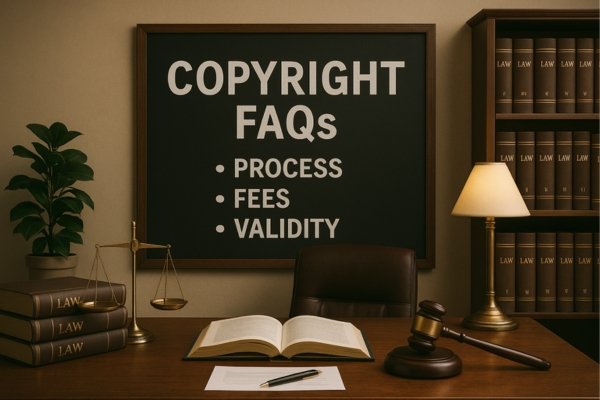
FAQs
Is it mandatory to register copyright in India?
No, copyright protection exists automatically once a work is created. However, registration provides stronger legal proof of ownership, making it easier to take action against infringement. That’s why many creators choose to learn how to register copyright in India.
How to register copyright in India online?
You can register copyright online by visiting the official portal copyright.gov.in
. Create an account, fill out Form XIV, upload your work and documents, pay the fees, and submit your application. After examination and approval, you’ll receive a Copyright Registration Certificate.
How long does copyright last in India?
For literary, musical, dramatic, and artistic works, copyright lasts for the lifetime of the author plus 60 years. For films, sound recordings, and government works, it lasts 60 years from the year of publication.
What types of works can be registered under copyright?
Copyright can be registered for literary works, artistic creations, musical compositions, cinematographic films, sound recordings, and computer software. Understanding eligible categories is an important part of how to register copyright in India.
What is the cost of registering a copyright in India?
The fee varies based on the type of work:
₹500 for literary, musical, or artistic works (except logos)
₹2,000 for artistic works used as logos/labels
₹5,000 for cinematograph films and computer software
₹2,000 for sound recordings
Can I register a logo under copyright?
Yes, logos can be registered as artistic works under copyright. However, if the logo is used for business or branding purposes, it is better to also register it as a trademark for stronger protection.
How much time does it take to register a copyright in India?
The process usually takes 6 to 12 months, depending on objections and examination by the registrar. Early filing ensures faster protection when you follow the process of how to register copyright in India.
